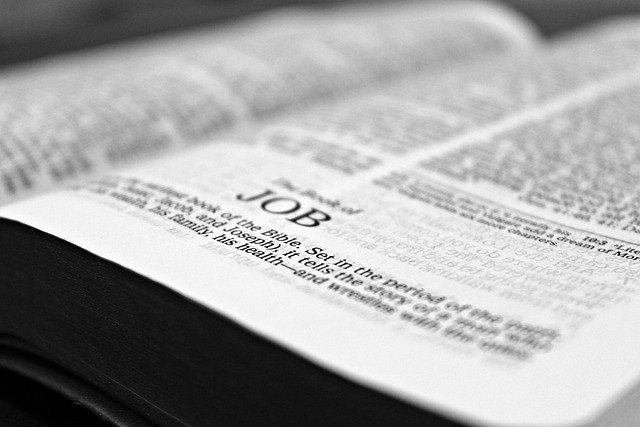Welcome to BibleStudyMinistry.com, your online Bible Study supplement source. Today we have a chapter summary on Job chapter 20. Before we get to the summary, let’s review the chapter below.
1 Then answered Zophar the Naamathite, and said,
2 Therefore do my thoughts cause me to answer, and for this I make haste.
3 I have heard the check of my reproach, and the spirit of my understanding causeth me to answer.
4 Knowest thou not this of old, since man was placed upon earth,
5 That the triumphing of the wicked is short, and the joy of the hypocrite but for a moment?
6 Though his excellency mount up to the heavens, and his head reach unto the clouds;
7 Yet he shall perish for ever like his own dung: they which have seen him shall say, Where is he?
8 He shall fly away as a dream, and shall not be found: yea, he shall be chased away as a vision of the night.
9 The eye also which saw him shall see him no more; neither shall his place any more behold him.
10 His children shall seek to please the poor, and his hands shall restore their goods.
11 His bones are full of the sin of his youth, which shall lie down with him in the dust.
12 Though wickedness be sweet in his mouth, though he hide it under his tongue;
13 Though he spare it, and forsake it not; but keep it still within his mouth:
14 Yet his meat in his bowels is turned, it is the gall of asps within him.
15 He hath swallowed down riches, and he shall vomit them up again: God shall cast them out of his belly.
16 He shall suck the poison of asps: the viper’s tongue shall slay him.
17 He shall not see the rivers, the floods, the brooks of honey and butter.
18 That which he laboured for shall he restore, and shall not swallow it down: according to his substance shall the restitution be, and he shall not rejoice therein.
19 Because he hath oppressed and hath forsaken the poor; because he hath violently taken away an house which he builded not;
20 Surely he shall not feel quietness in his belly, he shall not save of that which he desired.
21 There shall none of his meat be left; therefore shall no man look for his goods.
22 In the fulness of his sufficiency he shall be in straits: every hand of the wicked shall come upon him.
23 When he is about to fill his belly, God shall cast the fury of his wrath upon him, and shall rain it upon him while he is eating.
24 He shall flee from the iron weapon, and the bow of steel shall strike him through.
25 It is drawn, and cometh out of the body; yea, the glittering sword cometh out of his gall: terrors are upon him.
26 All darkness shall be hid in his secret places: a fire not blown shall consume him; it shall go ill with him that is left in his tabernacle.
27 The heaven shall reveal his iniquity; and the earth shall rise up against him.
28 The increase of his house shall depart, and his goods shall flow away in the day of his wrath.
29 This is the portion of a wicked man from God, and the heritage appointed unto him by God.
Job chapter 20 continues the ongoing discourse between Job and his friends, with Zophar taking his turn to offer his perspective on Job’s suffering and predicament. Zophar’s speech is characterized by its brevity and accusatory nature.
Zophar begins by expressing his impatience with Job’s lengthy speeches and the perception that Job is mocking them with his words. He insinuates that Job’s lack of restraint in speaking is a reflection of his foolishness and ignorance. Zophar believes that Job’s suffering is a result of his own wrongdoing, and he expects Job to acknowledge his guilt.
He goes on to describe the fate of the wicked, using vivid and somewhat gruesome imagery. Zophar paints a picture of the wicked person’s success and prosperity being short-lived. He claims that the wicked may enjoy material wealth and power for a time, but ultimately, their triumph is temporary. Zophar thinks that the wicked will face a swift and brutal downfall, likening their success to a fleeting dream.
Job Chapter 20 Summary
He then emphasizes that the wicked will face the consequences of their actions, including suffering and punishment. He implies that Job’s suffering is a direct consequence of his presumed wickedness and calls on him to repent. Zophar’s speech is steeped in the traditional belief that suffering is a divine punishment for sin.
This chapter underscores the ongoing debate within the Book of Job regarding the nature of suffering and divine justice. Zophar, like Eliphaz and Bildad before him, subscribes to the retribution principle, which asserts that suffering is a direct result of sin. Job, on the other hand, continues to assert his innocence and wrestle with the apparent disconnect between his righteousness and his profound suffering.
As the dialogue continues, the tension between Job and his friends intensifies, and the fundamental questions about theodicy and the relationship between human actions and divine retribution remain at the forefront of their discussions. This is the summary of Job chapter 20; Glory to the Creator of righteousness.

For more summaries and studies, click on summaries link right here. As always, be strong and very courageous.
Minister Koko
BSM
Want a better foothold of the geography and peoples of the ancient biblical world? Support and look into our current project, Africa the Land of Shem.
Learn about it here!

